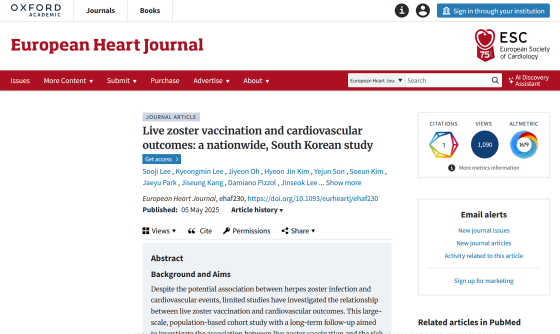Shingles vaccine may reduce risk of heart disease, stroke

Live zoster vaccination and cardiovascular outcomes: a nationwide, South Korean study | European Heart Journal | Oxford Academic
https://academic.oup.com/eurheartj/advance-article-abstract/doi/10.1093/eurheartj/ehaf230/8124786

Shingles vaccine lowers the risk of heart disease for up to eight years
https://www.escardio.org/The-ESC/Press-Office/Press-releases/shingles-vaccine-lowers-the-risk-of-heart-disease-for-up-to-eight-years
Shingles Vaccine Can Reduce Risk of Stroke And Heart Attack, Study Finds : ScienceAlert
https://www.sciencealert.com/shingles-vaccine-can-reduce-risk-of-stroke-and-heart-attack-study-finds
Shingles occurs when the chickenpox virus, which is usually present in children, remains dormant in the body for several years to several decades and is reactivated by aging or stress. The typical symptom is a band of blisters that appear along the nerves, which are painful and itchy. In addition, there is a sequela called postherpetic neuralgia, which causes pain even after the blisters have healed, and if blisters form near the eyes, there is a risk of vision loss.
Although death from shingles is rare, the older you are, the higher the risk of developing and becoming seriously ill, and there is a risk that aftereffects will reduce your quality of life for many years. For this reason, in Japan, shingles vaccines will be included in the regular vaccinations under the Preventive Vaccination Act from 2025.
Previous research has shown that if the shingles vaccine is not administered, approximately 30% of people will develop shingles in their lifetime. Furthermore, shingles has been linked to dementia, and research has shown that receiving the shingles vaccine reduces the risk of dementia.
Nature reports on research showing that shingles vaccine helps reduce risk of dementia, what are experts' opinions? - GIGAZINE

Recent research has also suggested that shingles may increase the risk of stroke and heart disease, so a research team including those from Kyung Hee University in Seoul, South Korea, investigated whether the shingles vaccine could reduce the risk of heart disease and stroke.
The research team collected data from several South Korean government agencies on whether people had received the shingles vaccine, as well as their age, sex, economic status, and health status. The data used in the study ultimately included a total of more than 1.2 million people over the age of 50 living in South Korea.
The analysis found that people who received the shingles vaccine had a 23% lower risk of overall cardiovascular disease, a 22% lower risk of coronary artery disease , a 26% lower risk of heart failure, and a 26% lower risk of major cardiovascular events such as stroke and heart attack.
The effect of vaccination against shingles on reducing the risk of cardiovascular disease was strongest for the first two to three years after vaccination, but the effect lasted for up to eight years. The effect was particularly strong in men, those under 60 years of age, and those with unhealthy lifestyles such as smoking, drinking, and lack of exercise.

'Shingles can cause blood vessel damage, inflammation and blood clot formation, which can lead to heart disease. By preventing shingles, vaccination may reduce these risks,' said Dong Keon Yon, a professor at Kyung Hee University's College of Medicine and co-author of the paper.
In addition, the vaccine used in this study was a live vaccine called 'Zostavax,' which is made by weakening the virus, but in recent years, a recombinant vaccine called 'Shingrix' (PDF file) that uses only viral proteins has also become popular. Further research is needed to know the effectiveness of Shingrix, but previous studies have shown that it is also associated with a reduced risk of dementia.
Related Posts:
in Science, Posted by log1h_ik







